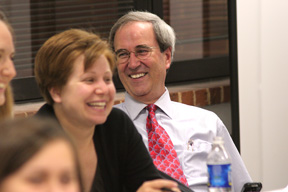Education is more than teaching people a set of skills. It should give people opportunities to continue to transform themselves and the lives of other people over the course of a lifetime, says Bob Corley, Ph.D.
 |
| Bob Corley, director of the Global and Community Leadership Honors Program (GCL), is teaching the course “Exploring Birmingham: Conflict and Community” this fall. |
“You do that not only by having a set of skills, but also by having a set of attitudes and perspectives about yourself and your place in the world,” says Corley.
Pushing students to develop themselves is a key component in training future leaders, says Corley, and he hopes the new Global and Community Leadership (GCL) Honors Program will play a pivotal role in doing that.
“We’re trying to attract to UAB some of the best and brightest who are going to make a commitment to transform themselves and the world,” says Corley, who directs the GCL.
The GCL joins the University Honors Program, Science and Technology Honors Program and Early Medical School Acceptance Program (EMSAP) to form UAB’s Honors Academy. Students will be able to fill out one application form online at www.uab.edu/honorsacademy and apply for one or more of the honors programs.
The vision of the GCL, which was created in the spring and has 23 students enrolled, is to connect students with their academic interests and personal passions to prepare them for local, national and global leadership.
Students will be engaged to explore and experience social, economic, cultural and public policy issues that are connected to both local and international environments. They will investigate, analyze and seek to understand common concerns faced by societies worldwide so they will emerge prepared to lead in the 21st century.
“Leadership for me is a deeply personal matter,” Corley says. “It has to do with first developing yourself as a person. There are certain kinds of skills you can teach, but being effective as a leader means having this sense of what is significant that needs to be addressed and understanding where you fit into that question. And then you must have the right knowledge in order to be an effective leader. You’ve got to have desire, motivation, skill – it all has to be linked together.”
Overarching vision
Given the legacy of Birmingham and UAB’s role in leading the city from its industrial past, issues related to social justice and race and class are among the topics the program seeks to explore. “If we’re going to do global and community leadership then it ought to be something where we’re engaged in, something that’s meaningful and transformative,” Corley explains.
Corley hopes to build on the global and community strengths UAB already has established, pointing to the numerous connections with other institutions around the world and to UAB President Carol Garrison’s role as the president of the Birmingham Regional Chamber of Commerce, which shows how the institution is intimately engaged in these areas.
Although some GCL-signature courses will be developed, the primary goal is to build upon the array of existing courses, steering students toward those that fit within their course of study. Corley says a variety of courses that look at global and community issues already are offered. He wants to take the existing curriculum and build on it, giving the GCL students wide latitude in the issues they pursue.
Corley and Michele Forman are teaching the course “Exploring Birmingham: Conflict and Community” this fall, and he uses it as an example of the type of courses in which he foresees students becoming engaged.
Corley wants students to gain real-world experience by their junior year, and explore the issue they want to focus on within the major they’ve chosen with someone working in the field. He also hopes students study that same issue somewhere else in the world.
“I want each student to get connected to an institution or organization in that country and with somebody who is working on their particular issue and to have a fairly intensive immersion in that issue,” he says.
Faculty role
Faculty will be able to engage highly motivated and talented students within the framework of their regular teaching load and responsibilities.
“We’re going to ask faculty to take these students into their class, welcome them and be a part of their group,” Corley says. “They’re going to be good students to have in your class, good students to teach.”
Corley hopes faculty members will include honor students in their regular course offerings and make available a parallel “honors” syllabus for them that would be enhanced in some way with extra research or work.
“I’m going to leave that up to the individual faculty,” Corley says. “I’ll consult with them, and we will work on it together as much as possible.
“My desire is not to overburden faculty, and they will be compensated for the extra work they have to do to grade the extra paper or do the extra work for the honors program.”
To learn more about the program, contact Kristin Boggs at kboggs@uab.edu or Corley at rcorley@uab.edu.